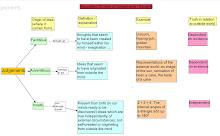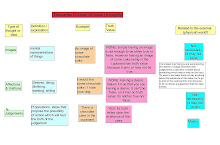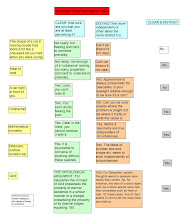Thursday, August 20, 2009
Sam bribes examiner scandal!!
It's all Ultimately Meaningless Anyway
Monday, July 27, 2009
Hurrah for Summer Homework!
1. Research and explain the difference between substance and property dualism. (Use Stanford Encyclopaedia of Philosophy and others, do not simply copy and paste).
2. Summarise Ryle’s notion of ‘The Ghost in the Machine’ you could try this: http://www.youtube.com/watch?v=xdlh8ACEHxk
3. Explain why materialism and physicalism can be regarded as ‘reductive’.
4. Investigate the claim that Descartes’ substance dualism leads to solipsism.
5. Work out what P.F Strawson means when he claims that ‘the concept of a person is logically prior to that of an individual consciousness’.
6. Buy and read Daniel C Dennett’s ‘Consciousness Evolves’
Friday, July 3, 2009
Qualia & Bat for me please!
Searle: Minds, Brains & Programs
Friday, June 12, 2009
PHILOSOPHY OF MIND
A2 A2 A2A2 A2 A2 A2 A2 A2 A2 A2 A2

 HERE A2A2 PHILOSOPHYSTARTSPHILOSOPHYHERE A2 A2A2 PHILOSOPHY STARTS HEREA2A2PHILOSOPHYA2 STARTSHERE A2A2 STARTS HEREA2A2 STARTS HERE A2
HERE A2A2 PHILOSOPHYSTARTSPHILOSOPHYHERE A2 A2A2 PHILOSOPHY STARTS HEREA2A2PHILOSOPHYA2 STARTSHERE A2A2 STARTS HEREA2A2 STARTS HERE A2
Monday, June 1, 2009
Last Words
- what is the relationship between our thoughts and the things we think about?
- How do the things that seem to go on inside our heads connect with the things that seem to go on outside our heads?
- What is this division between the internal (our minds) and the external (the rest of the world) really all about? Is there even a division at all?

Friday, May 22, 2009
The exam, the 'a priori' & a bit of a rant!
Sunday, May 17, 2009
Pink & the Animals

Sartre & the Nazis

Hume & Compatibilsm
 This should be read in conjunction with the handout Enquiry Concerning Human Understanding Section 8: Liberty and necessity Part 1.
This should be read in conjunction with the handout Enquiry Concerning Human Understanding Section 8: Liberty and necessity Part 1. We think we have free will because we do not feel as if our choices are determined in the same way as the events that occur with inanimate objects.
choices must be connected to motives / circumstances. If not what would they arise from?
choices form part of ‘causal chain’
We are determined by prior events but our choices form part of those prior events.
Because Hume denies the absolute necessity of cause & effect (as a law) he seems to open up the possibility of some kind of human agency.
Saturday, May 16, 2009
Thomas Pink: Compatibilism & Libertarianism and me.
> CAUSE empty belly (physiological)> EFFECT hunger > Should I have a chocolate biscuit or a carrot? (social conditioning etc. influences / determines? my CHOICE > my GOAL or purpose is either to stay slim and gorgeous or enjoy the chocolate biscuit and I imagine those possible futures as I decide > ACTION I eat a biscuit. My biscuit eating is a result of my choice, my choice gives it a goal and purpose and makes my ACTION intelligible (understandable) as an act of free will which forms part of a 'causal chain.'

Friday, May 15, 2009
Determinism
“Man’s life is a line that nature commands him to describe upon the surface of the earth, without his ever being able to swerve from it, even for an instant ... he is unceasingly modified by causes, whether visible or concealed, over which he has no control, which necessarily regulate his mode of existence, give the hue to his way of thinking, and determine his manner of acting. . . . Nevertheless, in despite of the shackles by which he is bound, it is pretended he is a free agent, or that independent of the causes by which he is moved, he determines his own will, and regulates his own condition.”
The problem that this brings about is that if we are without free will, then we cannot be held responsible for our behaviour. How can we justify praising or blaming anyone for anything if they could not have done anything else. Clearly this view has profound implications for our notions of morality and justice.

Please leave a comment if you've read this.
Jean-Paul Sartre: Existentialism & Libertarianism

Those who hide from this total freedom ... with deterministic excuses, I shall call cowards. Others, who try to show that their existence is necessary ... I shall call scum.

Tuesday, April 28, 2009
Free Will

Saturday, April 25, 2009
Homeworks you may have forgotten.

Also read to at least p.322. Read carefully and think about it. Make notes/highlight underline etc.
Below is the Easter Homework Which is also below under 'Free Easter Eggs":
1. (Some of you have done this one)
Explain and illustrate how Locke’s ideas about primary and secondary qualities use a distinction betweenontology and epistemology?
2.
(a) Explain and illustrate two strengths & two weaknesses of Idealism.
(b) ‘How things appear to me is only my representation of the way the world is.’ Discuss.
Read handouts: innate ideas; beyond empiricism & Rationalism on Sensory experience.
4.
RECEIVE AND READ POWERPOINTS FOR REVISION










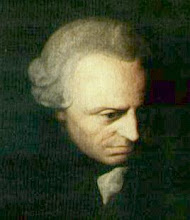
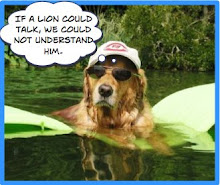




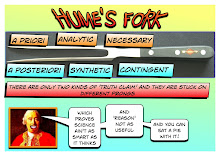
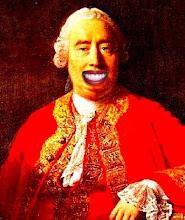



.jpg)

